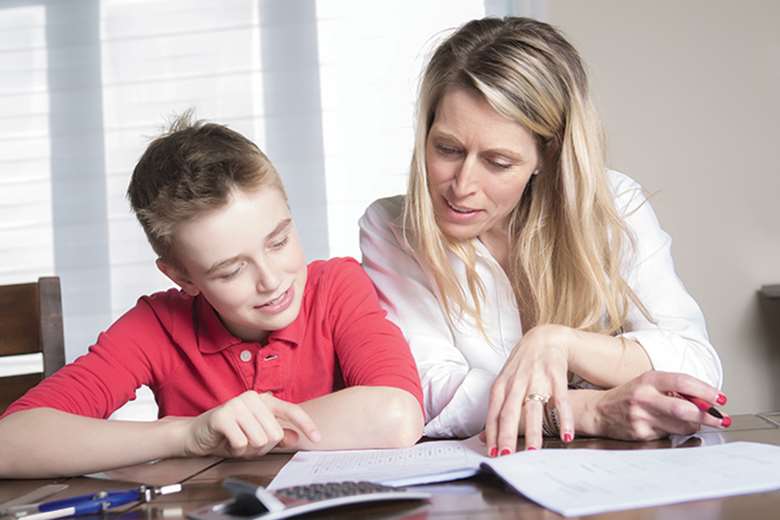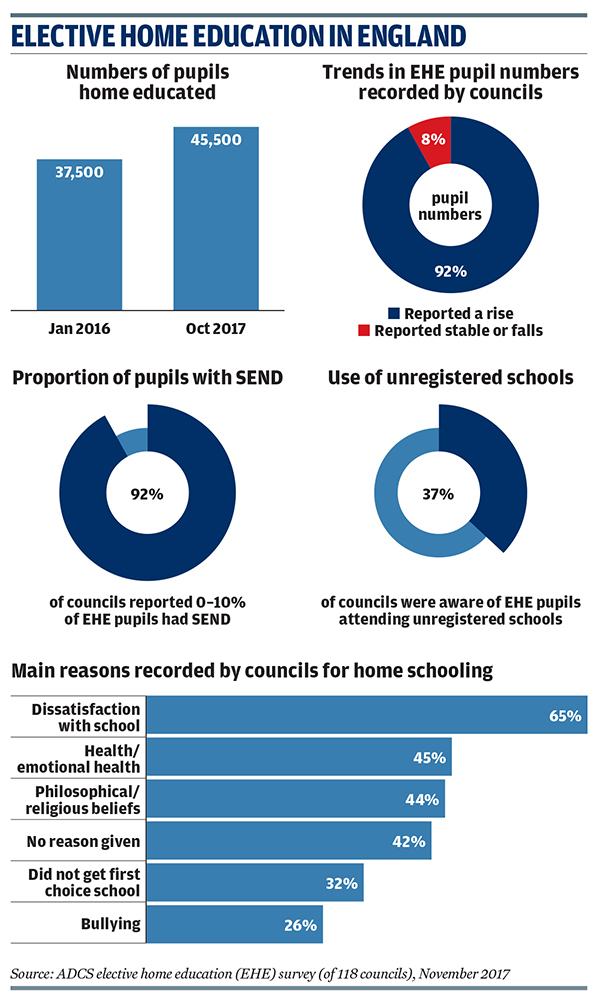The factors driving the increase in children educated at home
Derren Hayes
Tuesday, January 2, 2018
The rise in children being educated at home is partly blamed on schools failing to adequately support pupils with additional needs, and has raised concerns councils will struggle to monitor their safety and wellbeing.

Elective home education (EHE) draws in a range of complex and controversial issues, including the right of parents to educate their children themselves, the teaching of religious and social beliefs, how schools meet the needs of pupils who may require extra support, and the safeguarding powers of local authorities.
Ofsted's 2016/17 annual report, published last month, outlines some of the challenges facing local authorities on EHE.
Home-educated children are at greater risk of being "isolated" from health and care agencies, making them harder to protect, the inspectorate's report states.
EHE has been a feature in a number of high-profile serious case reviews, such as the death of eight-year-old Dylan Seabridge in 2011.
A survey of councils recently found three-quarters had carried out children in need assessments of home-schooled children and two-thirds had undertaken child protection investigations.
Rising numbers
There is no official data on EHE pupil numbers and parents are not required to register a child who is home educated. The current statutory guidance also allows parents to decline the offer of a home visit by the local authority.
However, Ofsted's research at four councils suggests the number of EHE children is rising. "All local authorities we visited identified that the number of home-educated children is growing," it states. "Providing capacity to oversee the growing number of home-educated children is becoming a challenge for authorities."
Research by the Association of Directors of Children's Services (ADCS) found the number of home-schooled children rose 21 per cent in the past two years (see graphics).
The ADCS survey found there were 35,487 children known to be home-schooled on 5 October 2017 across 118 English councils, which equates to an average of 300 children per council.
The aggregated figures show there were 45,500 home-schooled children across all 152 English councils, with this ranging from 35,819 at its lowest point in the year to 49,154 at its highest. By comparison, the previous survey carried out on 21 January 2016, estimated the national aggregated figure to be 37,500.
More than nine out of 10 respondents to the recent survey reported rises in EHE children, the vast majority reporting "steady year-on-year increases".
However, some said there had been significant increases: one authority had received 39 new EHE notifications on 1 September, raising overall numbers to 758.
Another authority, with a total EHE population of 1,540, reported a 56 per cent increase in its EHE population in the past year.
An authority with much lower overall numbers had also seen its proportion of children home schooled rise from 1.6 per cent in 2014/15 to 2.4 per cent in 2016/17.
Meanwhile, council records showed that more than 80 per cent of EHE children had attended school at some stage.
The ADCS survey also gathered information on the most common reasons children are home schooled, with dissatisfaction with the school being the most commonly cited reason.
Other common reasons included issues around health and emotional wellbeing, philosophical or religious reasons, not getting their school preference and bullying (see graphic).
Unregistered schools
The Ofsted report highlights the issue of children being taught in unregistered schools, such as those run by faith groups.
It has identified 291 potential illegal schools since January 2016, and had inspected 125 by September 2017, with nearly a third receiving warning notices.
The ADCS's 2016 survey showed that one in five local authorities reported being aware of home-educated children attending unregistered schools.
Falling through the gaps in education, a report published in November 2017 by the Office of the Children's Commissioner for England, says the growth in EHE children and unregistered schools could be linked.
"Because these schools are unregistered, they are covert in nature; they are almost always hidden, unregulated and uninspected," the report states. "As such, it is impossible to assess the quality of the child's education and their wellbeing within the settings."
Ofsted says "tensions between belief systems and British values" are a motivation for some communities to try avoiding the educational and safeguarding standards expected of schools.
"This matters, because British values of democracy, tolerance, individual liberty, mutual respect and rule of law are the principles that keep society free from the radical and extreme views that can often lead to violence," it states.
The children's commissioner's report comes to the same conclusions, also highlighting how teaching and equipment may be substandard at some unregistered schools, while allegations of corporal punishment have emerged in extreme cases.
Philosophical reasons
At the National Children and Adults Services conference in October, representatives from councils across England - from rural to inner city areas - spoke about EHE numbers "significantly" increasing. They said that some of this is due to parents home schooling for "philosophical" reasons, although rates vary widely between authorities.
Children's commissioner for England Anne Longfield, who spoke at the conference, said this group of children could range from 15 per cent in some areas, but up to 30 per cent in others. "That's significant," she says. "Philosophical campaigners are a powerful lobby, but make up a minority of children being home-educated. We want to understand what the outcomes are for those children."
A delegate from Sunderland told the conference that the council had seen EHE children treble in number in the past year and blamed this on closer scrutiny of exclusion rates by Ofsted, rather than a rise in pupils being removed for philosophical or religious reasons.
Off-rolling
In recent years, Ofsted has highlighted concerns over the high exclusion rates of some mainstream secondary schools. DfE figures published in August 2017 show permanent exclusions rose by a third between 2012/13 and 2015/16, from 4,630 to 6,685.
Meanwhile, the statistics show children with special educational needs and disabilities (SEND) are five-times more likely to be excluded than other children. Ofsted found formal exclusions of children with SEND is high in a third of areas.
With high exclusion rates on Ofsted's radar, evidence is emerging that schools are finding other ways to remove children whose behaviour may be challenging or who may be underachieving academically.
"Some parents reported that they had been asked to keep their children at home because head teachers said they could not meet their children's needs," states Ofsted's report.
"Many children who have SEND present challenging behaviour. These children and young people can be particularly vulnerable to underachievement."
Ofsted said these informal exclusions of children with SEND are an "unacceptable" practice.
A survey of parents by the National Autistic Society on behalf of the all-party parliamentary group on autism found 40 per cent said their child's school place did not fully meet their needs.
"Some parents feel forced to home school their children because there is no appropriate school provision locally, while in some areas there were no schools available that met the child's needs and they were out of the education system entirely," states the report.
The practice of "off-rolling" - whereby schools remove a pupil from the admission register - was raised in the children's commissioner's report. This cites a 2013 survey that found nearly two per cent of school leaders admitted doing it. It can include schools threatening exclusion unless parents take up the offer to home-educate, or failing to put in place additional support pupils need.
Analysis by Education Datalab shows that in 2014/15, there were 20,000 children who left mainstream school and failed to be re-registered at another state-funded school. Forty per cent of these moves occurred when the child was in year 10 or 11, when pupils are leading up to GCSE exams.
"It needs to be established whether some schools are off-rolling pupils to protect the schools average GCSE results," the children's commissioner's report says. "Mainstream schools tend to benefit from these instances of pupils leaving."
Potential solutions
The DfE says exclusions on any grounds other than for disciplinary reasons is unlawful.
Schools may not exclude pupils because of their academic attainment or ability and sending a pupil home without recording it as an exclusion is also not permitted, a DfE spokesperson says. In addition, it is to launch an externally-led review of exclusions practice "focusing on the experiences of those groups disproportionately likely to be excluded".
For John Freeman, children's services consultant and former director of children's services in Dudley, the solution is simple: when inspected by Ofsted, schools should be required to produce a list of pupils who have left the school in the previous two years and the reason why, with this checked against the school register.
"If there is any evidence of off-rolling, that should result in an immediate ‘special measures' judgment," he adds.
Meanwhile, the Local Government Association wants to see the introduction of a compulsory register for parents to report home-schooling arrangements. ADCS agrees, saying such registers should be held by local authorities.
"Councils should be resourced to establish systems and safeguards to assure themselves that home-schooled children are receiving a good standard of education, delivered in a suitable learning environment, and that they are safe."





